Additional Recycling Programs
Soft Plastic Film Recycling Program:
The Plastic Film Recycling Pilot Program was initiated in March 2018 at locations in Building 10-B2 level and has expanded to Buildings 13, 14C, 35A, 37, 45 and 50. The program requires NIH employees to recycle clean and dry plastic films in collection boxes located at listed buildings. The full recycling collection boxes are picked up by ESI and transported to the recycling facility. They are then shipped to manufacturing companies that use the film to manufacture plastic wood for railings, decks, cladding, etc. In CY2021, the NIH generated 0.75 tons of commingled HDPE and 7.84 tons of commingled LDPE plastic film (compared to 8.28 tons of commingled HDPE and 10.20 tons of commingled LDPE plastic film in CY2020).
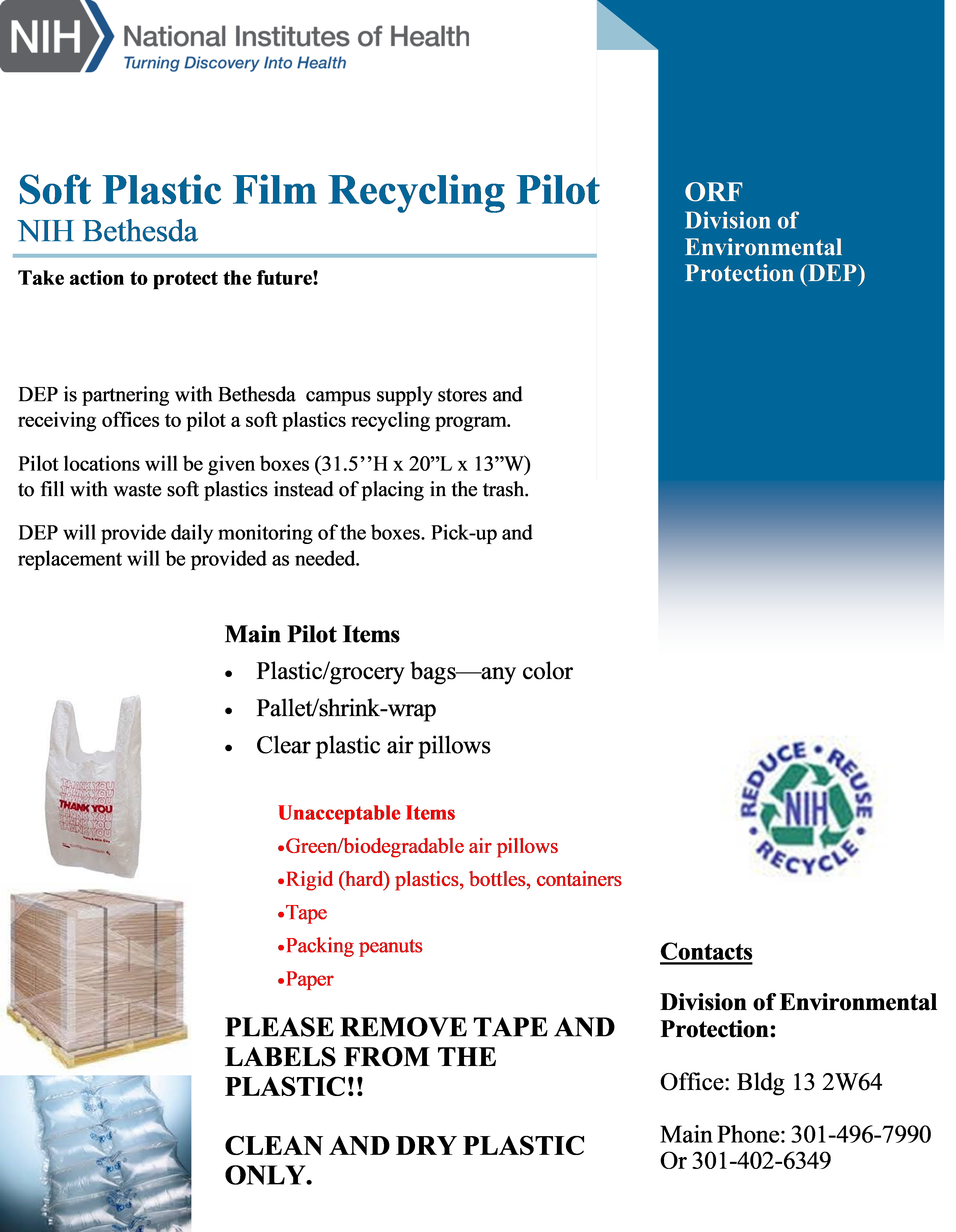
| 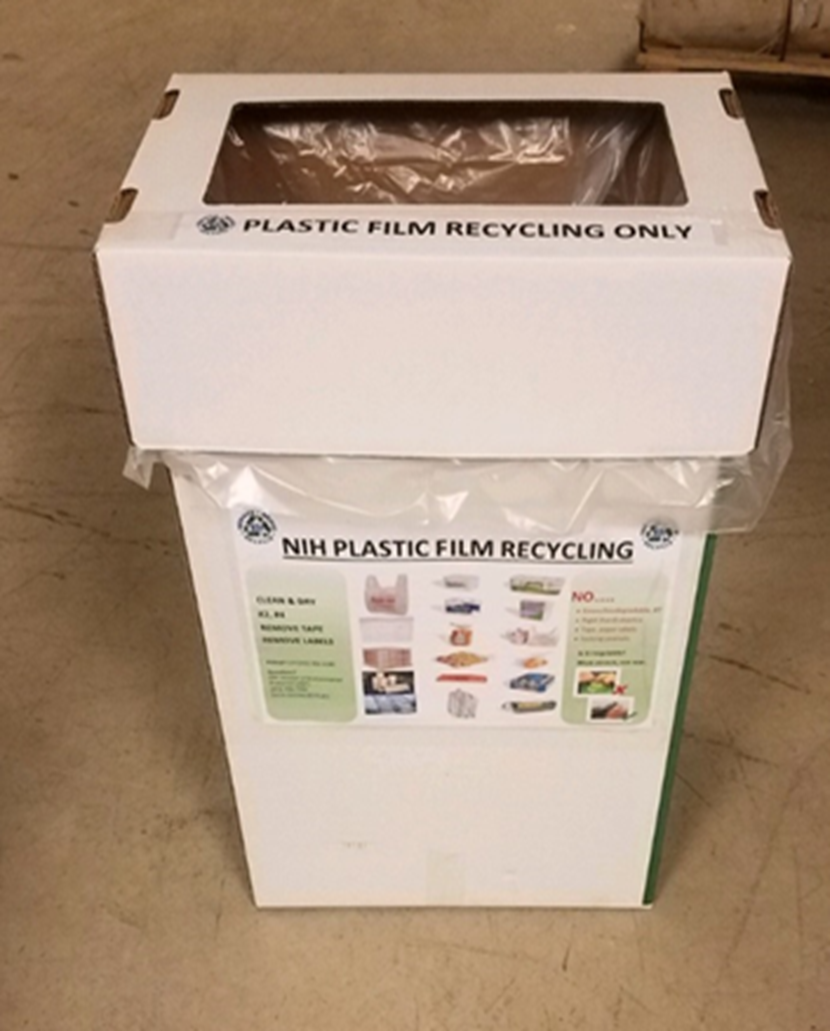
|
Collection Locations:
|
Building # |
Room # |
Room Description |
Container |
|---|
10
|
B2-Dock
|
Loading Dock |
1 Gaylor |
|
10 |
B2-C119 & 121 |
Cherokee Contractor |
2 Boxes |
10
|
B2-N248A
|
Bulk Storage
|
2 Boxes
|
10
|
B2-N205
|
Walter Moore Office
|
1 Box
|
10
|
B1-D25
|
Joe Cowling Office
|
1 Box
|
10
|
B2-B39 SS Store
|
Supply Store Storage
|
1 Box
|
10
|
9B05
|
|
1 Box
|
8
|
|
Near 1st & 2nd Floor Elevator
|
2 Boxes
|
13
|
2W646
|
DEP Office
|
1 Box
|
14C
|
Outside
|
|
Large Blue Cart
|
33
|
1N18
|
1st Floor
|
2 Boxes
|
33
| |
3W10A
| |
35A
| |
1EF
|
1 Box
|
35A
| |
1DE
|
1 Box
|
37
|
4060C
|
Outside LCBG 4th Floor Office
|
1 Box
|
37
| |
1st Floor
|
1 Box
|
37
|
3042
|
3rd Floor
|
1 Box
|
45
| |
2nd & 3rd Floor
|
2 Boxes
|
50
| |
Loading Dock
|
1 Box
|
50
| |
3rd Floor
|
1 Box
|
Pipette Tip Racks:
Please empty your pipette tip racks into the designated burgundy collection bins, which are typically located in hallways or near elevators. The pipette tip racks are shipped directly to a processor to be melted into black pellets. The pallets are shipped to a processor to make flowerpots.
| 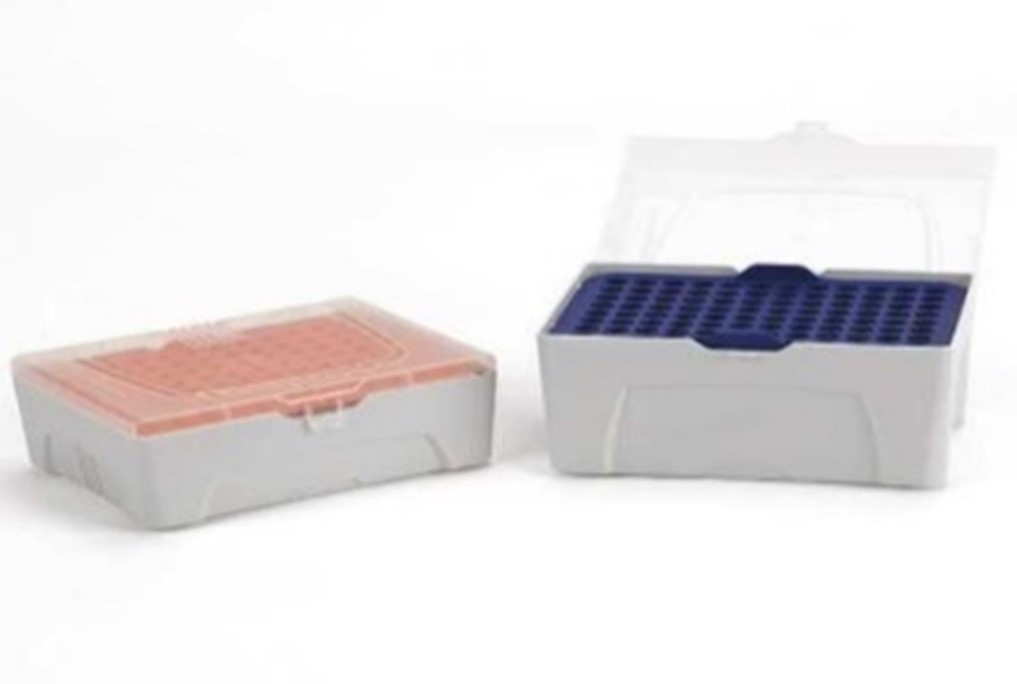
|
Construction Debris:
Sun Recycling and C&D Recovery, LLC cull the construction debris loads for recyclable materials through a combination of automated and manual methods. The debris is separated into brick, concrete, asphalt, metal (ferrous and non-ferrous), wood, dirt, and cardboard. These materials are then shipped to their respective processors. Fines are shipped to landfills for use as cover and trash/debris undergoes waste-to-energy incineration.
To see more information about the Construction Debris Program, please view the
Construction Debris webpage.
Scrap Metals:
Scrap metals are transported to Montgomery Scrap, where the metals are separated by type (ferrous vs. non-ferrous) and shipped to processing facilities. Here the scrap is melted into ingots for reuse in manufacturing.
Wooden Pallets:
Wooden pallets are transported to Valleywood, where the pallets in good condition are resold and the damaged pallets are repaired.
Toner and Ink Cartridges:
Please place your empty toner and ink cartridges into the designated burgundy collection bins, which are typically located in hallways or near elevators. The cartridges are transported to Virginia, where they are sorted, boxed and shipped for remanufacturing.
Yard Waste:
Yard waste is collected and recycled by the NIH Grounds Maintenance Department. Yard waste includes grass clippings, leaves and tree and bush limbs.
Cardboard:
Please flatten cardboard and place it next to general recycling bins or in cardboard recycling racks on loading docks. Cardboard is transported to Georgetown Paper Stock, where it is baled and shipped to a paper mill to make new fiberboard boxes for a variety of uses.
Styrofoam Take-Back Program:
The NIH Styrofoam Return Program is an FY2018 Project/Program winner of a Green Labs HHS Green Champions Award. It was initiated in 2010 as a free take-back program by Thermo Fisher Scientific (TFS) at Building 35 and expanded to Buildings 10 (B2 loading docks), 50, 35, 37 and 49. The program was deactivated due to TFS's decision to change their courier service, which no longer would service NIH. The success of this program has resulted in positive environmental and economic impacts, since coolers are recycled free of charge to the NIH for beneficial reuse. This process eliminates these items from landfill disposal and reduces greenhouse gas emissions. NIH coolers diverted from landfills increased from 513 pounds in 2010 to 3,780 pounds in 2019. The benefits of this environmental stewardship help the NIH to achieve its goal to recycle at least 50% of all non-hazardous solid waste.
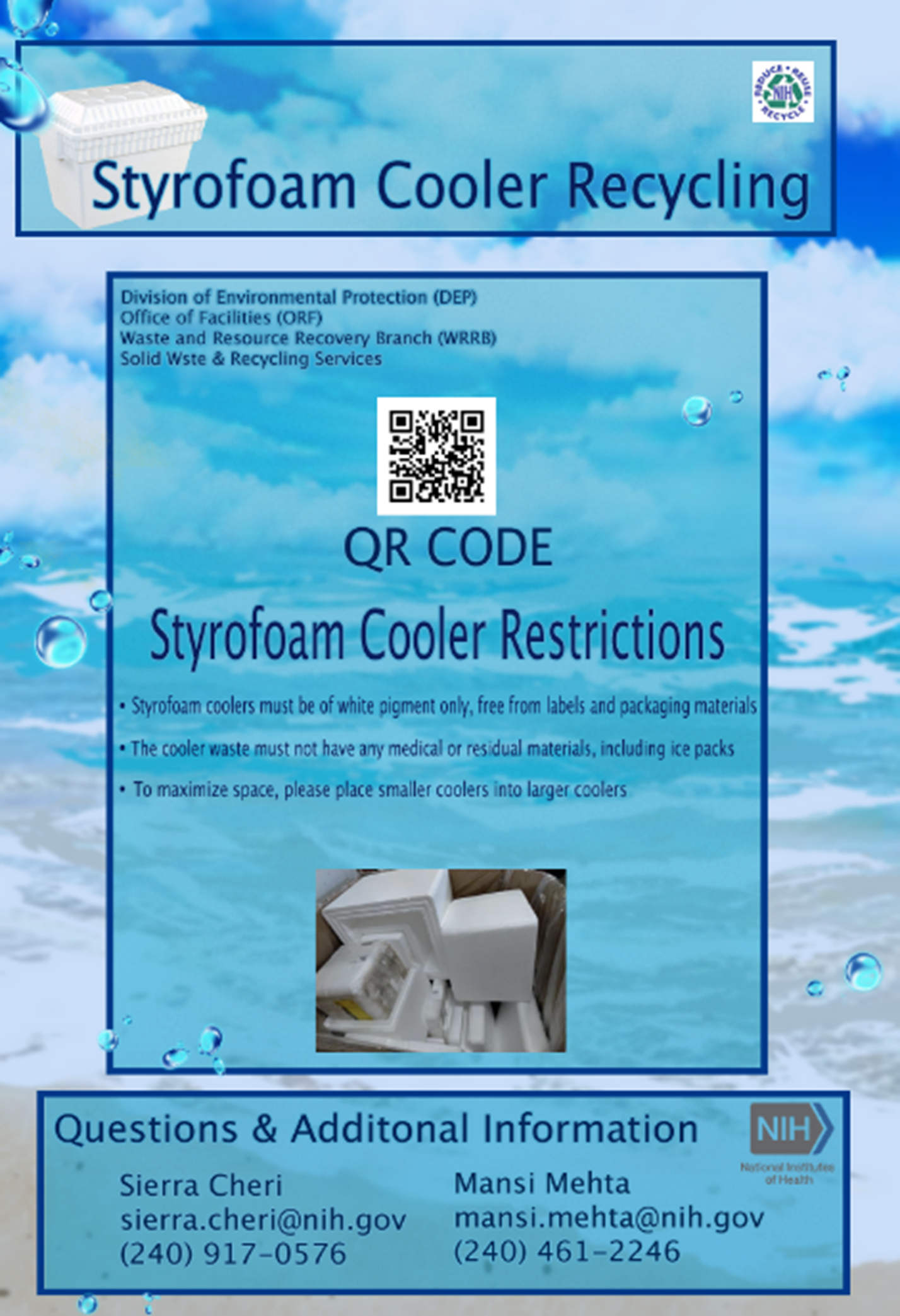
| 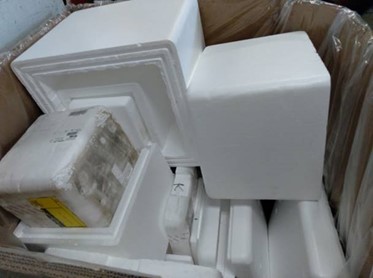
|
Current Update: The current Styrofoam Take-Back Program that was re-initiated back in August of 2021 has established a pick-up schedule to service each building on a routine basis. If a storage bin is not located in your building, please contact
Mansi Mehta to request a storage bin. This material will be transported and delivered to a local processing facility where the material will be offloaded and densified for re-use. The success of this program has resulted in positive environmental and economic impacts since coolers are recycled for beneficial reuse to eliminate their disposal to landfills and reduce greenhouse gas emissions. The NIH Bethesda campus generated 13,890lbs of Styrofoam coolers from August-December of 2021. The benefits of this environmental stewardship help the NIH to achieve its goal to recycle at least 50% of all non-hazardous solid waste. There are a few restrictions that follow this program re-initiation; please see the details below.
Styrofoam Cooler Restrictions:
- Styrofoam coolers must be white pigment only and free from labels and packaging materials.
- The cooler must not contain any medical or residual materials, including ice packs.
- To maximize space, please place smaller coolers inside larger coolers.
List of Current Building Locations:
Date Placed
|
Building #
|
Room #
|
Room Description
|
Container
|
Point of Contact
|
Telephone
|
Pick Up Days
|
|---|
October 2021
| 8
| Lobby
| North Lobby exit/entrance
| 1 GAYLORD
| ESI Monitor
| 301-402-6349
| Tuesday
|
July 2021
| 10
| Loading Dock
| Next to room B2-A09
| 1 GAYLORD
| ESI Monitor
| 301-402-6349
| M-F
|
April 2022
| 33
| Loading Dock
| Outside - behind compactor
| 1 GAYLORD
| ESI Monitor
| 301-402-6349
| Tuesday
|
April 2022
| 35
| Loading Dock
| Next to entrance - behind compactor
|
1 GAYLORD
|
ESI Monitor
| 301-402-6349
| M-F
|
August 2021
| 37
| Loading Dock
| Next to office
| 1 GAYLORD
| ESI Monitor
| 301-402-6349
| M-F
|
August 2021
| 41
| Loading Dock
| Inside - across from vending machine
| 1 GAYLORD
| ESI Monitor
| 301-402-6349
| Tuesday
|
July 2021
| 49
| B2-E30
| Inside double doors from loading dock
| 1 GAYLORD
| ESI Monitor
| 301-402-6349
| Tuesday
|
August 2021
| 50
| Loading Dock
| Next to double doors
| 1 GAYLORD
| ESI Monitor
| 301-402-6349
| Tuesday
|
Compost Program:
The NIH Food Scrap Program was initiated to reduce the amount of waste buildup in landfills, reduce excessive greenhouse gas emissions, protect our environment and help promote our mission for zero waste. Food scraps are any pre-consumed food substance that is discarded. This can include grains, eggshells, coffee grounds, expired or spoiled food items, peelings and much more!
For more information on setting up a food scraps recycling program at your kitchen or cafeteria, please contact DEP at 301-496-7990.
Electronics & Furniture:
Non-accountable electronics and furniture are collected annually on the Bethesda campus for America Recycles Day (ARD) in November. These items are sent to the NIH Warehouse in Rockville, MD (Contact the Division of Logistics Services within OLAO at (301)496-4247). Staff looking to contribute can organize a small-batch electronics collection campaign for your office. Full boxes can be delivered directly to the NIH Warehouse or held in your office until the next ARD collection on campus.